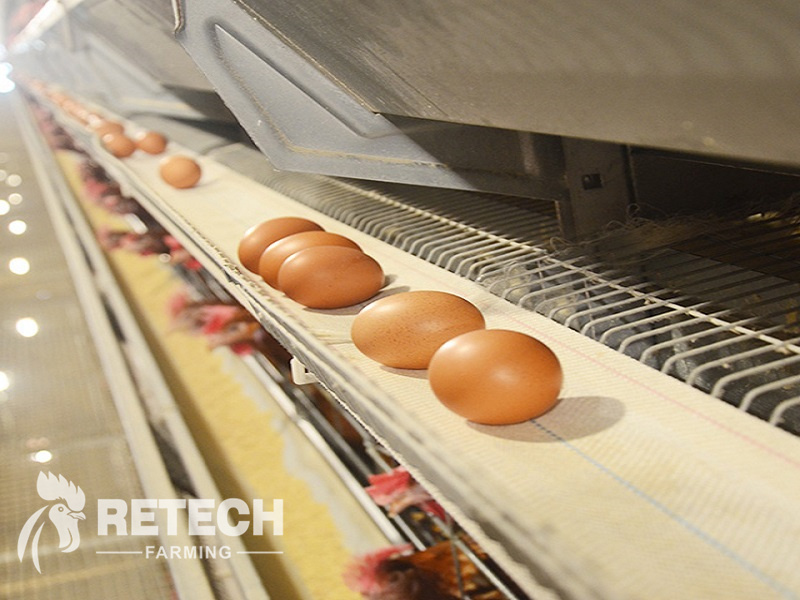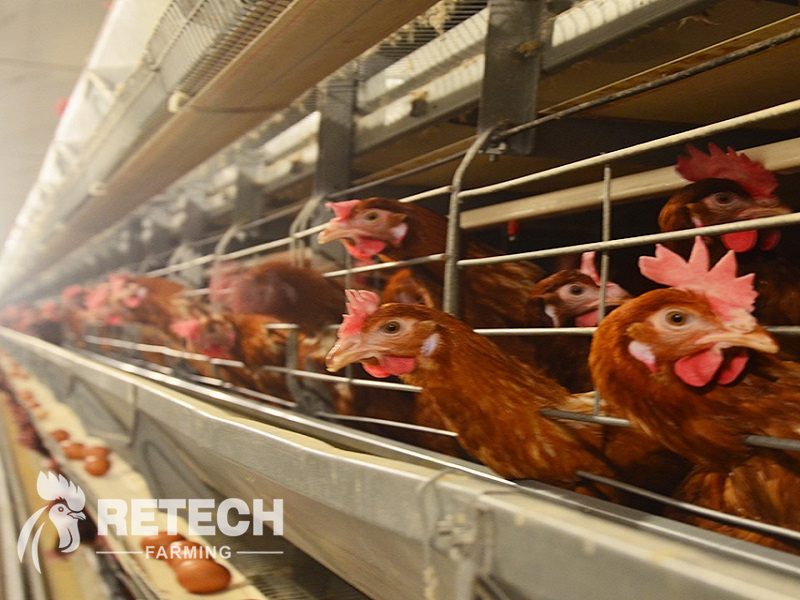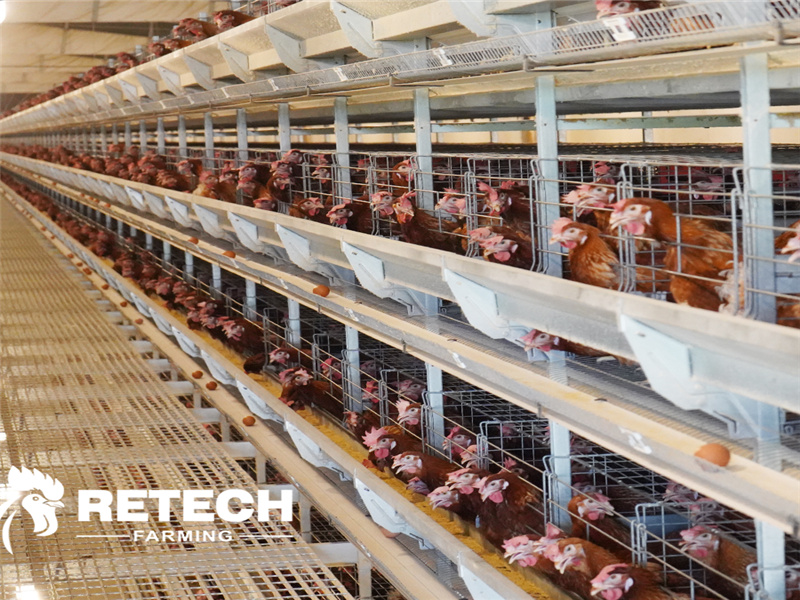വിറ്റാമിൻ സിയുടെ ഗുണങ്ങൾ
വിറ്റാമിൻ സി കോഴികളിലെ ഓക്സിഡേഷൻ-റിഡക്ഷൻ പ്രതിപ്രവർത്തനത്തിൽ പങ്കെടുക്കുന്നു, എൻസൈം സിസ്റ്റത്തിലെ സജീവ സൾഫൈഡ്രൈൽ ഗ്രൂപ്പിനെ സംരക്ഷിക്കുന്നു, ശരീരത്തിൽ വിഷവിമുക്തമാക്കൽ പങ്ക് വഹിക്കുന്നു; ഇന്റർസെല്ലുലാർ പദാർത്ഥത്തിന്റെ സമന്വയത്തിൽ പങ്കെടുക്കുന്നു, കാപ്പിലറി പ്രവേശനക്ഷമത കുറയ്ക്കുന്നു, മുറിവ് ഉണക്കുന്നതിനെ പ്രോത്സാഹിപ്പിക്കുന്നു, ഫോളിക് ആസിഡ് ഹൈഡ്രജൻ ഫോളിക് ആസിഡ് രൂപപ്പെടുത്തുന്നതിനെ പ്രോത്സാഹിപ്പിക്കുന്നു, ഫെറസ് അയോണുകളെ സംരക്ഷിക്കുന്നു, വിളർച്ച തടയുന്നതിൽ പങ്കുവഹിക്കുന്നു, ശരീരത്തിന്റെ പ്രതിരോധശേഷി വർദ്ധിപ്പിക്കുന്നു, സമ്മർദ്ദ പ്രതികരണം ഒഴിവാക്കുന്നു. വിറ്റാമിൻ സി കുറവായിരിക്കുമ്പോൾ, കോഴികൾക്ക് സ്കർവി, വളർച്ച സ്തംഭനം, ശരീരഭാരം കുറയ്ക്കൽ, സന്ധികൾ മൃദുവാകൽ, ശരീരത്തിന്റെ വിവിധ ഭാഗങ്ങളിൽ വിളർച്ച എന്നിവയ്ക്ക് സാധ്യതയുണ്ട്.
വേനൽക്കാലത്ത് കോഴികൾക്ക് വിറ്റാമിൻ സി അധികമായി നൽകുന്നത് കോഴികൾ കൂടുതൽ മുട്ടകൾ ഉത്പാദിപ്പിക്കാൻ കാരണമാകും. സാധാരണ താപനിലയിൽ, അനുബന്ധ ഭക്ഷണം നൽകാതെ തന്നെ കോഴി ശരീരത്തിന് വിറ്റാമിനുകൾ സമന്വയിപ്പിക്കാൻ കഴിയും. എന്നിരുന്നാലും, വേനൽക്കാലത്ത് താപനില കൂടുതലാണ്, വിറ്റാമിൻ സി സമന്വയിപ്പിക്കാനുള്ള കോഴി ശരീരത്തിന്റെ പ്രവർത്തനം കുറയുന്നു, ഇത് കോഴിക്ക് വിറ്റാമിൻ സിയുടെ കുറവുണ്ടാക്കുന്നു.
വിറ്റാമിൻ സി എങ്ങനെ ചേർക്കാം
1. വിറ്റാമിൻ സി പൊടി (അല്ലെങ്കിൽ ടാബ്ലെറ്റ് പൊടിച്ചത്) പൊടിച്ച്, ആനുപാതികമായി തീറ്റയിൽ കലർത്തി കോഴികൾക്ക് കൊടുക്കുക.
2. വിറ്റാമിൻ സി പൊടിച്ച് വെള്ളത്തിൽ ഇടുക, തുടർന്ന് ഈ വിറ്റാമിൻ സി ലായനി കോഴികൾക്ക് കുടിക്കാൻ വെള്ളമായി ഉപയോഗിക്കുക.
കാലാവസ്ഥ ചൂടുള്ളപ്പോൾ, വിറ്റാമിൻ സി ചേർക്കുന്നത് മുട്ടത്തോടുകളുടെ ഗുണനിലവാരം ഗണ്യമായി മെച്ചപ്പെടുത്തും.
വേനൽക്കാലത്ത് ചിക്കൻപോക്സ് ബാധിക്കുന്നത് കോഴി കർഷകർ എങ്ങനെ തടയാം?
കൊതുകുകളുടെ കടിയേറ്റാണ് ചിക്കൻപോക്സ് പകരാനുള്ള പ്രധാന മാധ്യമം. വേനൽക്കാലത്ത്, ഉയർന്ന താപനിലയിലും ഉയർന്ന ആർദ്രതയിലും കൊതുകുകൾ വേഗത്തിൽ പെരുകുകയും പെരുകുകയും ചെയ്യുന്നു, ഇത് ഇടയ്ക്കിടെ ചിക്കൻപോക്സ് ഉണ്ടാകുന്നതിന് കാരണമാകുന്നു, ഇത് കർഷകർക്ക് വലിയ പ്രശ്നങ്ങൾ സൃഷ്ടിക്കുന്നു. കർഷകർ ഇത് എങ്ങനെ തടയണം?
ഉയർന്ന നിലവാരമുള്ള വലിയ ബ്രാൻഡ് വാക്സിൻ നിർമ്മാതാക്കളെ തിരഞ്ഞെടുക്കുക, വാക്സിൻ സംഭരണ സാഹചര്യങ്ങൾ കർശനമായി നിയന്ത്രിക്കുക, രോഗപ്രതിരോധ നടപടിക്രമങ്ങൾ ശാസ്ത്രീയമായി രൂപപ്പെടുത്തുക, ശരിയായ രോഗപ്രതിരോധ രീതികൾ കൈകാര്യം ചെയ്യുക തുടങ്ങിയവ.
രോഗപ്രതിരോധം.
ഈ രോഗത്തിന് നിലവിൽ ഉപയോഗിക്കുന്ന വാക്സിൻ പ്രധാനമായും ചിക്കൻ ഭ്രൂണം അല്ലെങ്കിൽ സെൽ കൾച്ചർ ഉപയോഗിച്ച് തയ്യാറാക്കുന്ന ചിക്കൻപോക്സ് വൈറസ് ക്വായിലൈസേഷൻ അറ്റൻവേറ്റഡ് വാക്സിൻ ആണ്, കൂടാതെ സെൽ കൾച്ചർ ഉപയോഗിച്ച് തയ്യാറാക്കുന്ന അറ്റൻവേറ്റഡ് വാക്സിനാണ് ഏറ്റവും മികച്ച ഫലം നൽകുന്നത്.
ഇനോക്കുലേഷൻ രീതി.
പ്രധാന രീതി ചിറകിൽ കുത്തിവയ്ക്കുന്ന രീതിയാണ്. നേർപ്പിച്ച വാക്സിൻ ഒരു പേനയുടെ അഗ്രം അല്ലെങ്കിൽ ചിക്കൻപോക്സ് വാക്സിന് പ്രത്യേകം ഉപയോഗിക്കുന്ന ഒരു സൂചി ഉപയോഗിച്ച് മുക്കി, പേശികൾ, സന്ധികൾ, രക്തക്കുഴലുകൾ എന്നിവയ്ക്ക് പരിക്കേൽക്കുന്നത് ഒഴിവാക്കാൻ ചിറകിന്റെ ഉൾവശത്തുള്ള ചിറകിന്റെ അവസ്കുലാർ ത്രികോണാകൃതിയിലുള്ള ഭാഗത്ത് കുത്തിവയ്ക്കാം. ആദ്യത്തെ പ്രതിരോധ കുത്തിവയ്പ്പ് സാധാരണയായി ഏകദേശം 10-20 ദിവസം പ്രായമായിരിക്കും, രണ്ടാമത്തെ പ്രതിരോധ കുത്തിവയ്പ്പ് പ്രസവം ആരംഭിക്കുന്നതിന് മുമ്പാണ് നടത്തുന്നത്. സാധാരണയായി, വാക്സിനേഷൻ കഴിഞ്ഞ് 10-14 ദിവസങ്ങൾക്ക് ശേഷം പ്രതിരോധശേഷി ഉത്പാദിപ്പിക്കപ്പെടും. കോഴിക്കുഞ്ഞുങ്ങളുടെ രോഗപ്രതിരോധ കാലയളവ് (സംരക്ഷണ കാലയളവ്) 2-3 മാസമാണ്, മുതിർന്ന കോഴികളുടേത് 5 മാസവുമാണ്.
കോഴികളുടെ എണ്ണം കൂടുന്നത്, വായുസഞ്ചാരം മോശമാകൽ, ഇരുട്ട് നിറഞ്ഞതും ഈർപ്പമുള്ളതുമായ കൂടുകൾ, എക്ടോപാരസൈറ്റുകൾ, പോഷകാഹാരക്കുറവ്, വിറ്റാമിനുകളുടെ അഭാവം, പോഷകാഹാരക്കുറവും പരിപാലനവും എന്നിവയെല്ലാം രോഗം ഉണ്ടാകുന്നതിനും വഷളാകുന്നതിനും കാരണമാകും.
ചിക്കൻപോക്സ് തടയുന്നതിന്, മാനേജ്മെന്റ് സാങ്കേതികവിദ്യയുടെ നിലവാരം മെച്ചപ്പെടുത്തുന്നതിലും നാം ശ്രദ്ധിക്കണം. താഴെപ്പറയുന്ന വശങ്ങളിൽ നിന്ന് നമുക്ക് ആരംഭിക്കാം:
1. സൈറ്റ് ന്യായമായി ആസൂത്രണം ചെയ്യുക, ശാസ്ത്രീയമായി നിർമ്മിക്കുക കോഴിക്കൂട്, സ്ഥലത്തെ ഡ്രെയിനേജ് ശ്രദ്ധിക്കുക, കോഴിക്കൂടിനകത്തും പുറത്തും പരിസ്ഥിതി വൃത്തിയാക്കലും അണുവിമുക്തമാക്കലും ശക്തിപ്പെടുത്തുക. ഉയർന്ന താപനിലയിലും ഉയർന്ന ആർദ്രതയിലും വായുസഞ്ചാരത്തിനും ഈർപ്പം പ്രതിരോധത്തിനും ശ്രദ്ധ നൽകണം;
2. സമഗ്രമായ രീതി പിന്തുടരുക, വ്യത്യസ്ത പ്രായത്തിലുള്ള കോഴികളെ ഗ്രൂപ്പുകളായി വളർത്തുക, സംഭരണ സാന്ദ്രത ഉചിതമാണ്; ഭക്ഷണത്തിൽ സമഗ്രമായ പോഷകാഹാരം നിലനിർത്തുക, കോഴികളുടെ രോഗ പ്രതിരോധശേഷി വർദ്ധിപ്പിക്കുക.
3. വേനൽക്കാലത്തും ശരത്കാലത്തും കോഴിക്കൂടിനകത്തും പുറത്തും കൊതുകുനിവാരണ പ്രവർത്തനങ്ങൾ ശക്തിപ്പെടുത്തുക;
വിവിധ കാരണങ്ങളാൽ കോഴികൾക്ക് കൊത്തൽ അല്ലെങ്കിൽ മെക്കാനിക്കൽ കേടുപാടുകൾ ഒഴിവാക്കുക.
വാട്ട്സ്ആപ്പ്: 8617685886881
പോസ്റ്റ് സമയം: ജൂൺ-21-2023










